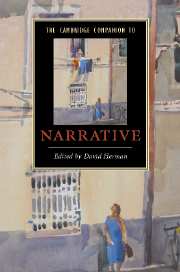Book contents
- Frontmatter
- Part I Preliminaries
- Part II Studying narrative fiction: a starter-kit
- Part III Other narrative media (a selection)
- Part IV Further contexts for narrative study
- 13 Gender
- 14 Rhetoric/ethics
- 15 Ideology
- 16 Language
- 17 Cognition, emotion, and consciousness
- 18 Identity/alterity
- Glossary
- Further reading
- Index
13 - Gender
from Part IV - Further contexts for narrative study
Published online by Cambridge University Press: 28 September 2007
- Frontmatter
- Part I Preliminaries
- Part II Studying narrative fiction: a starter-kit
- Part III Other narrative media (a selection)
- Part IV Further contexts for narrative study
- 13 Gender
- 14 Rhetoric/ethics
- 15 Ideology
- 16 Language
- 17 Cognition, emotion, and consciousness
- 18 Identity/alterity
- Glossary
- Further reading
- Index
Summary
Over the last twenty years, the role that gender might play in the analysis of narratives has emerged as an important area of consideration. Feminist narratology is the umbrella term which covers the many different ways in which gender-related aspects of narratives and the models used to analyze them may be interrogated from a feminist point of view. The integration of insights derived from gender studies incorporates a range of distinctive approaches including feminist perspectives along with neighboring areas of inquiry, such as queer theory.
Warhol characterizes feminist narratology in useful, broad terms as “the study of narrative structures and strategies in the context of cultural constructions of gender.” These cultural constructions of gender are significant because narrative analysis does not take place in a context-free vacuum. Rather, the models of narrative theory have been derived from the study of actual texts. Feminists would argue that the telling as well as the analysis of narratives are human activities - activities that necessarily entail gendered assumptions and practices.
Critics working within feminist narratology have asked questions about gender and narrative that cover a range of topics and embrace a variety of perspectives. These critics take both narrative texts and narrative theory as their object of study and reflect different stages and debates in feminist theorizing.
- Type
- Chapter
- Information
- The Cambridge Companion to Narrative , pp. 189 - 202Publisher: Cambridge University PressPrint publication year: 2007
- 3
- Cited by

